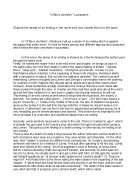"When The Emperor Was Divine". Confession: Who is speaking? Is the speech ironic? Why has Otsuka chosen to end the novel this way? What does this imply about our ability to separate out the enemy, the other, in our midst?
When The Emperor Was Divine
Q: Confession: Who is speaking? Is the speech ironic? Why has Otsuka chosen to end the novel this way? What does this imply about our ability to separate out the ‘enemy’, the ‘other’, in our midst?
In the chapter titled “Confession” the speaker admits to the reader the truths of the story. This person talks about how the manner in which the police gathered and questioned them was true. This person confesses all the real life truths the Japanese went through whether it was in the camps or back at their home life. They confess their thoughts and feelings on the matter.
The father is the speaker in the duration of the confession. He is the spokesperson for all the Japanese during this time and saying their inner most sacred thoughts and feelings since most didn’t have the voice to do so themselves. It is in the confession after some time spent with the police that he just breaks down and tells the police what they want to hear. “I’m sorry. There. That's it. I’ve said it. Now can I go?”(143). Otsuka included this part because it has two deeper meanings. The first being that it was said in a sarcastic manner as if saying ‘well, sorry for being who I am. I can just change my looks and culture with the snap of my fingers because you don’t like what I look like.’ The father was not apologizing for the things that occurred or for being different. He was apologizing because of their closed mindedness. He feels sad for them because they will never understand that what they perceive to be right is truly wrong. They let their emotions and preconceived notions cloud their judgment of right and wrong. They have incriminated an entire race and culture for something that happened during war. These are American citizens that they have shipped off to some camp to keep them ‘safe.’ Not war criminals or spies but fellow American citizens. This simple statement speaks volumes to the father’s state of mind. He holds so much sadness and anger, but knows nothing will change and that is the truly sad part about it all.








